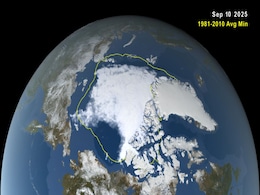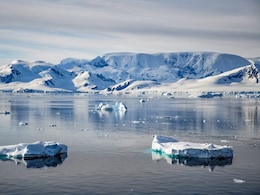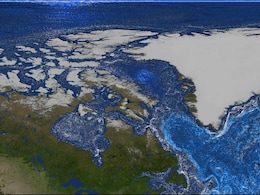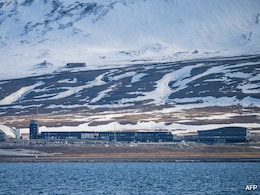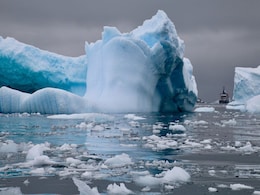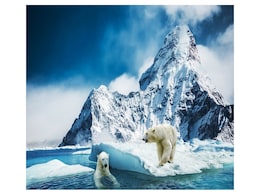Sea Ice In Arctic
- All
- News
-

New Study Explains Why Earth’s Poles Are Heating Up at an Alarming Rate
- Tuesday December 30, 2025
- Written by Gadgets 360 Staff
The Arctic is warming faster than anywhere on Earth, and new research reveals why. Using aircraft and ground measurements, scientists found that openings in sea ice boost cloud formation while pollution from oil fields alters Arctic chemistry. Together, these processes form powerful feedback loops that trap heat and speed ice loss. The findings hig...
-
 www.gadgets360.com
www.gadgets360.com
-

Satellite Observations Record Arctic Sea Ice at Lowest Level of the Year
- Sunday September 21, 2025
- Written by Gadgets 360 Staff
NASA satellites recorded Arctic sea ice at 1.78 million sq miles on Sept. 10, 2025—its tenth-lowest extent. Antarctic ice also stayed below seasonal averages. Scientists stress these lows reflect long-term climate-driven changes reshaping Earth’s polar regions.
-
 www.gadgets360.com
www.gadgets360.com
-

Sea Ice To Ocean Currents, Antarctica Is Undergoing Abrupt Changes
- Thursday August 21, 2025
- World News | The Conversation
Melting sea ice allows oceans to warm more rapidly, which melts more sea ice. Once triggered, they can be difficult or even impossible to reverse on timescales meaningful to humans.
-
 www.ndtv.com
www.ndtv.com
-

Greenland's Melting Glaciers Feed Ocean Life, Study Finds
- Thursday August 7, 2025
- Written by Gadgets 360 Staff
A new NASA-led study reveals that Greenland’s melting glaciers are fueling life in the Arctic Ocean. Each summer, massive freshwater plumes from glaciers like Jakobshavn drag deep-sea nutrients upward, boosting phytoplankton growth by up to 40%. These microscopic organisms form the base of the marine food web and play a key role in carbon absorpt...
-
 www.gadgets360.com
www.gadgets360.com
-

Arctic Sea Ice Hits Lowest Peak In 47-Year Satellite Record: US Agency
- Thursday March 27, 2025
- World News | Agence France-Presse
This year's Arctic sea ice peak is the lowest in the 47-year satellite record, the US National Snow and Ice Data Center (NSIDC) said Thursday.
-
 www.ndtv.com
www.ndtv.com
-

Greenland’s Melting Glaciers Expose 1,620 km of New Coastline Since 2000
- Tuesday April 1, 2025
- Written by Gadgets 360 Staff
Over the past 20 years, Greenland’s glaciers have melted enough to expose 1,620 kilometres of new coastline, altering the Arctic’s geography. Satellite data from 2000 to 2020 tracked these changes, showing significant ice loss. The study also identified 35 newly exposed islands, some of which remain unclaimed on existing maps. Scientists warn o...
-
 www.gadgets360.com
www.gadgets360.com
-

Global Sea Ice Cover At Record Low In February Amid Persistent Hot Streak
- Thursday March 6, 2025
- World News | Agence France-Presse
In February, temperatures spiked up to 11 degrees Celsius above average near the North Pole as the world continued its persistent heat streak, said Europe's climate monitor.
-
 www.ndtv.com
www.ndtv.com
-

Arctic Ocean Likely to Experience Ice-Free Day by 2027, Study Warns
- Thursday December 5, 2024
- Written by Gadgets 360 Staff
A study published in Nature Communications predicts the Arctic Ocean could face its first ice-free day as early as 2027, marking a critical environmental milestone. Conducted using 11 climate models and 366 simulations, the research highlights the urgent need for emission reductions. The loss of sea ice in the Arctic exacerbates global warming thro...
-
 www.gadgets360.com
www.gadgets360.com
-

Polar Bears in Alaska Face Rising Pathogen Threats Due to Climate Change
- Tuesday December 3, 2024
- Written by Gadgets 360 Staff
Polar bears in the Chukchi Sea are increasingly exposed to pathogens like Toxoplasma gondii, brucellosis, and canine distemper due to warming climates. Researchers revealed a significant rise in pathogen antibodies in polar bears since the 1990s, linking this trend to reduced sea ice, altered diets, and human interaction. The findings raise concern...
-
 www.gadgets360.com
www.gadgets360.com
-

New Study Explains Why Earth’s Poles Are Heating Up at an Alarming Rate
- Tuesday December 30, 2025
- Written by Gadgets 360 Staff
The Arctic is warming faster than anywhere on Earth, and new research reveals why. Using aircraft and ground measurements, scientists found that openings in sea ice boost cloud formation while pollution from oil fields alters Arctic chemistry. Together, these processes form powerful feedback loops that trap heat and speed ice loss. The findings hig...
-
 www.gadgets360.com
www.gadgets360.com
-

Satellite Observations Record Arctic Sea Ice at Lowest Level of the Year
- Sunday September 21, 2025
- Written by Gadgets 360 Staff
NASA satellites recorded Arctic sea ice at 1.78 million sq miles on Sept. 10, 2025—its tenth-lowest extent. Antarctic ice also stayed below seasonal averages. Scientists stress these lows reflect long-term climate-driven changes reshaping Earth’s polar regions.
-
 www.gadgets360.com
www.gadgets360.com
-

Sea Ice To Ocean Currents, Antarctica Is Undergoing Abrupt Changes
- Thursday August 21, 2025
- World News | The Conversation
Melting sea ice allows oceans to warm more rapidly, which melts more sea ice. Once triggered, they can be difficult or even impossible to reverse on timescales meaningful to humans.
-
 www.ndtv.com
www.ndtv.com
-

Greenland's Melting Glaciers Feed Ocean Life, Study Finds
- Thursday August 7, 2025
- Written by Gadgets 360 Staff
A new NASA-led study reveals that Greenland’s melting glaciers are fueling life in the Arctic Ocean. Each summer, massive freshwater plumes from glaciers like Jakobshavn drag deep-sea nutrients upward, boosting phytoplankton growth by up to 40%. These microscopic organisms form the base of the marine food web and play a key role in carbon absorpt...
-
 www.gadgets360.com
www.gadgets360.com
-

Arctic Sea Ice Hits Lowest Peak In 47-Year Satellite Record: US Agency
- Thursday March 27, 2025
- World News | Agence France-Presse
This year's Arctic sea ice peak is the lowest in the 47-year satellite record, the US National Snow and Ice Data Center (NSIDC) said Thursday.
-
 www.ndtv.com
www.ndtv.com
-

Greenland’s Melting Glaciers Expose 1,620 km of New Coastline Since 2000
- Tuesday April 1, 2025
- Written by Gadgets 360 Staff
Over the past 20 years, Greenland’s glaciers have melted enough to expose 1,620 kilometres of new coastline, altering the Arctic’s geography. Satellite data from 2000 to 2020 tracked these changes, showing significant ice loss. The study also identified 35 newly exposed islands, some of which remain unclaimed on existing maps. Scientists warn o...
-
 www.gadgets360.com
www.gadgets360.com
-

Global Sea Ice Cover At Record Low In February Amid Persistent Hot Streak
- Thursday March 6, 2025
- World News | Agence France-Presse
In February, temperatures spiked up to 11 degrees Celsius above average near the North Pole as the world continued its persistent heat streak, said Europe's climate monitor.
-
 www.ndtv.com
www.ndtv.com
-

Arctic Ocean Likely to Experience Ice-Free Day by 2027, Study Warns
- Thursday December 5, 2024
- Written by Gadgets 360 Staff
A study published in Nature Communications predicts the Arctic Ocean could face its first ice-free day as early as 2027, marking a critical environmental milestone. Conducted using 11 climate models and 366 simulations, the research highlights the urgent need for emission reductions. The loss of sea ice in the Arctic exacerbates global warming thro...
-
 www.gadgets360.com
www.gadgets360.com
-

Polar Bears in Alaska Face Rising Pathogen Threats Due to Climate Change
- Tuesday December 3, 2024
- Written by Gadgets 360 Staff
Polar bears in the Chukchi Sea are increasingly exposed to pathogens like Toxoplasma gondii, brucellosis, and canine distemper due to warming climates. Researchers revealed a significant rise in pathogen antibodies in polar bears since the 1990s, linking this trend to reduced sea ice, altered diets, and human interaction. The findings raise concern...
-
 www.gadgets360.com
www.gadgets360.com


